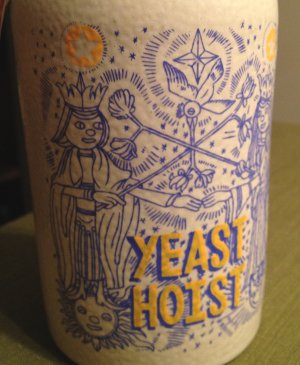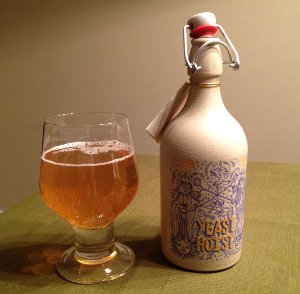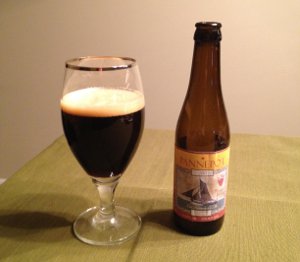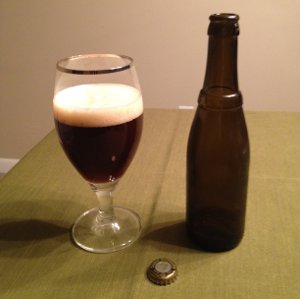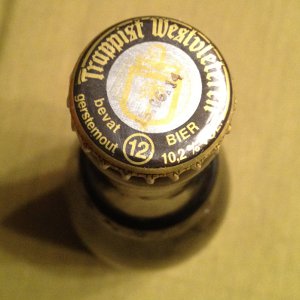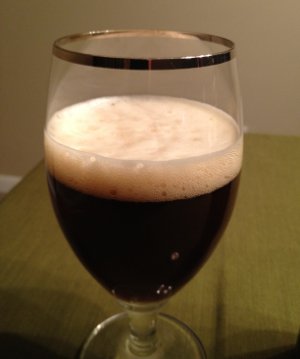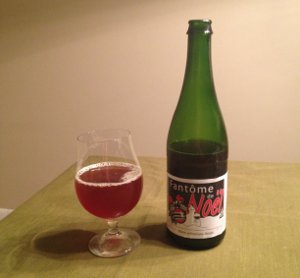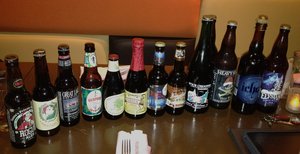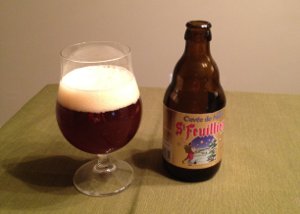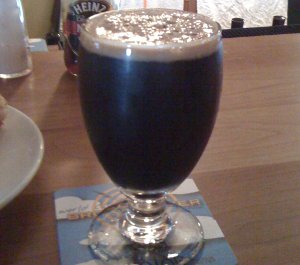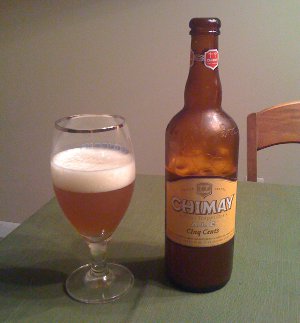It’s easy to get caught up in the hustle-and-bustle of new experimental brews, limited releases and white whale beers. As such, many first-rate beers linger on the shelves, unnoticed. I’ve had all of Rochefort’s beers before, but it has been far too long since I’ve revisited them. They are true classics. If you have not tried them, you should probably be out hunting for a bottle rather than reading this post.
Rochefort is a small town in southeast Belgium. A few miles down the road lies Rochefort’s Trappist monastery, Notre Dame de Saint Remy. The monks there started brewing beer in 1595, though recent operations started in 1899. As usual, Michael Jackson provides some interesting background based on a rare interview and tour with the head brewer:
There are 25 monks at the abbey, and four have jobs in the brewery, along with five secular workers. The monks rise each morning at 3:15, and have the mash under way before heading for High Mass at 7a.m. …
The beers are brewed from two Pilsener malts and one Munich type, with dark cane sugar added in the kettle. The hops are German Hallertau and Styrian Goldings, added twice. Two strains of yeast are use in primary fermentation an bottle-conditioning. White crystal sugar is used as a priming in the bottle.
“Two of the pale malts, two of the sugars, two hop varieties two yeast strains . . . two of this and two of that . . . we like to keep it simple,” laughed Father Antoine.
Indeed, it is even rumored that all three of Rochefort’s beers start from a single wort, which they modify by adding varying amounts of dark candy sugar to meet different strengths. All three of the beers share a similar flavor profile, so this does make sense, but I don’t think it’s ever been confirmed (and in looking at the difference between the weakest and strongest beers, that’s a lot of adjunct that they’d have to add). In any case, like the other Trappist breweries, Rochefort only sells their beer to help sustain the monastery and some charitable causes. As such, production is fairly low and won’t be raised to meet demand. In general, though, you shouldn’t have a problem finding at least one of the three varieties.
Speaking of which, I’ve always wondered about the way a lot of Belgian beers are numbered. St. Bernardus has a 6, 8 and 12. Westvleteren has an 8 and a 12. And Rochefort has a 6, 8, and 10. I had always assumed that it was a general reference to strength (sort of like Dubbel, Tripel, and Quadrupel), and in a manner of speaking, it is. However, in more specific terms, the numbers are a reference to original gravity. 6 corresponds with an original gravity of 1.060, 8 corresponds to 1.080, and so on*. Interestingly, the Jackson article referenced above mentions: “This is handy, observed Father Antoine, because they are ready to drink at six, eight and 10 weeks.” Go figure. Of course, these are bottle conditioned, high alcohol beers, so they can actually stand up to time rather well.
A while back, I picked up each of the available varieties, originally intending to do a triple feature, but that didn’t work out as planned. Rather than get stupid drunk one night, I decided to stretch this out over a couple of weeks. I tried them in order of strength, from lowest to highest.
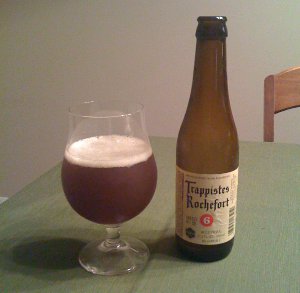
Trappistes Rochefort 6 – Apparently the least common of the three beers, this one is only brewed once a year. I’ve never had a problem finding it though, so perhaps that’s no longer in effect (that or people tend to gravitate towards the higher strength beers). Pours a cloudy reddish brown color with a couple fingers of quickly disappearing tan head. Aroma is very fruity, and not the typical Belgian strong dark fruitiness either. There’s something different about this. Bready Belgian yeast aromas are also present, along with a sorta nuttiness and toffee, but both aromas clearly take a back seat to the fruitiness. The taste goes along similar lines – a well balanced fruity sweetness throughout, with some more intricate and subtle flavors emerging as it warms up. Again, not sure what that particular fruit flavor is, but I’ve never had anything quite like it (except for other Rochefort beers). As the 6 is the “weakest” of these beers, I was expecting it to be lighter and maybe even watery, but it was highly carbonated and full bodied. Very easy to drink. I really love this beer. Wonderfully complex and unique, but still approachable. A
Beer Nerd Details: 7.5% ABV bottled (11.2 oz). Drank from a tulip glass on 7/31/11.
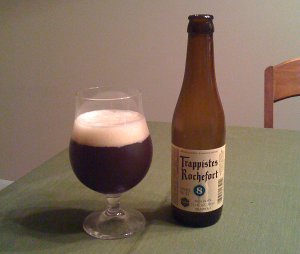
Trappistes Rochefort 8 – Pours a slightly deeper, darker brown color with a couple fingers of head. Aroma is more intense, but along the same lines. Taste is perhaps a bit sweeter, with just a hint of additional stickiness. I think you can taste the extra alcohol, but it’s still well balanced with the rest of the beer. Again, intricate and complex flavors emerging even more as it warms up. Mouthfeel is a bit fuller bodied, but it’s not a huge difference.. Like the 6, I do love this beer, which is similar, but bigger and richer. Indeed, I believe this one is my favorite of the three, even warranting the highest rating I can give, the vaunted Kaedrin A+
Beer Nerd Details: 9.2% ABV bottled (11.2 oz). Drank from a tulip glass on 8/6/11.
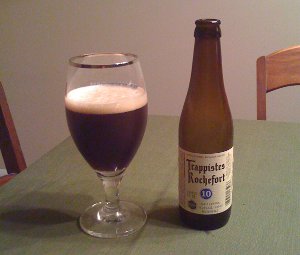
Trappistes Rochefort 10 – Deep, dark brown color, similar to the 8, but some of that reddish color is also seeping in… Seemingly less head. Aroma is very rich, but along similar lines. The taste is definitely boozier and sweeter than the other two varieites. I’m drinking this a couple weeks after the other two, so my comparative palate is a little off, but my feeling is that the extra alcohol here really does give this beer a whole different character. Mouthfeel is heavy, a little less carbonated and again, very full bodied. There’s more of a stickiness apparent, presumably due to the extra sugar and alcohol. The thing is, it’s all still very well balanced – no small feat considering the 0.040 difference in original gravity. An amazing beer and a nice complement to the other two. A
Beer Nerd Details: 11.3% ABV bottled (11.2 oz). Drank from a tulip glass on 8/20/11.
It’s almost a shame to compare and rate these three beers, yet I do find that I prefer the 8 above the other two. Interestingly, I think I might even prefer the 6 to the 10**, which is not to say that the 10 is bad or anything. Indeed, I’d put it near the top of any best-of list. Hmmm. I should “research” this more. By which I mean I probably shouldn’t wait another two years before having more Rochefort!
* To complicate matters further, Randy Mosher’s Tasting Beer claims that the O.G. for the 6 is 1.072, the 8 is 1.078 and the 10 is 1.096. Take from this what you want. It’s great beer no matter what!
** Despite the BA nerds’ ratings (which put the 10 at the top), it seems I’m not alone in my preferred ranking of 8, 6, then 10. Jay’s recently released Beer Samizdat 100 features these three beers in that order, even going so far as to name the 8 the best beer evar (personal preferences may differ, but I find it hard to argue with that choice).
